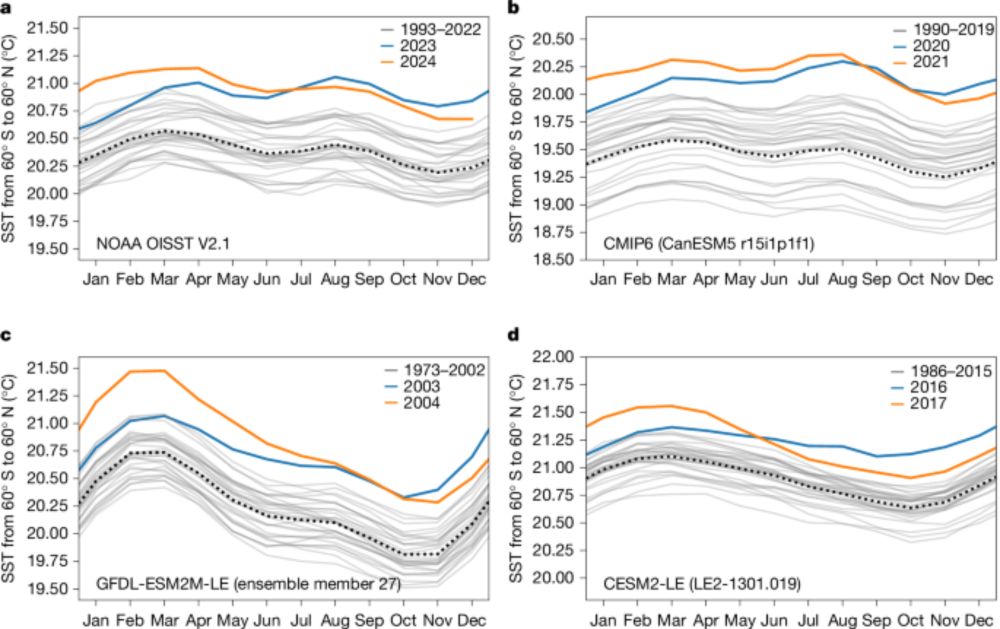


@profmattengland.bsky.social
6 pumps run the global ocean current.
2 northern pumps are 15% weak #AMOC
4 southern pump are 30% weak #AOC
agupubs.onlinelibrary.wiley.com/doi/full/10....
#TP2.16.2
x.com/bratananium/...


@profmattengland.bsky.social
6 pumps run the global ocean current.
2 northern pumps are 15% weak #AMOC
4 southern pump are 30% weak #AOC
agupubs.onlinelibrary.wiley.com/doi/full/10....
#TP2.16.2
x.com/bratananium/...
@polarocean.bsky.social
bsky.app/profile/pola...
@trackow.bsky.social
bsky.app/profile/trac...
bsky.app/profile/mice...
@tguinaldo.bsky.social
bsky.app/profile/tgui...
@profmattengland.bsky.social
bsky.app/profile/prof...
Is it true that climate models cannot simulate such SST jumps? What is common to such jumps? How will SSTs evolve over the next months and years? Are we in uncharted territory? More from our recent study in Nature is here👇

@polarocean.bsky.social
bsky.app/profile/pola...
@trackow.bsky.social
bsky.app/profile/trac...
bsky.app/profile/mice...
@tguinaldo.bsky.social
bsky.app/profile/tgui...
@profmattengland.bsky.social
bsky.app/profile/prof...
8. Teleconnections to Other Global Climate Impacts and Tipping Points.
@ryankatzrosene.bsky.social
What happens in the Atlantic doesn't just stay in the Atlantic.
@profmattengland.bsky.social
What happens in the
Antarctic
doesn't just stay in the Antarctic.

8. Teleconnections to Other Global Climate Impacts and Tipping Points.
@ryankatzrosene.bsky.social
What happens in the Atlantic doesn't just stay in the Atlantic.
@profmattengland.bsky.social
What happens in the
Antarctic
doesn't just stay in the Antarctic.
"It’s from the ocean back to the ice, and then back into the ocean again,
that can trigger a runaway change where we do see the overturning potentially collapse altogether"
@profmattengland.bsky.social said.
// same as #AMOC
grist.org/climate/anta...

"It’s from the ocean back to the ice, and then back into the ocean again,
that can trigger a runaway change where we do see the overturning potentially collapse altogether"
@profmattengland.bsky.social said.
// same as #AMOC
grist.org/climate/anta...
@profmattengland.bsky.social
1) ice shelves melt
2) Antarctic Overturning circulation slows
3) Less nutrients for phytoplankton moves up
4) less fish
5) less food for humans
@polarrobs.bsky.social
go.nature.com/45H0bqS
grist.org/climate/anta...

@profmattengland.bsky.social
1) ice shelves melt
2) Antarctic Overturning circulation slows
3) Less nutrients for phytoplankton moves up
4) less fish
5) less food for humans
@polarrobs.bsky.social
go.nature.com/45H0bqS
grist.org/climate/anta...
The relentless warming of Antarctica and its surrounding waters is a long-term trend — a sort of chronic sickness for the far south.
@profmattengland.bsky.social "Every fraction of a degree" matters
go.nature.com/45H0bqS
grist.org/climate/anta...


The relentless warming of Antarctica and its surrounding waters is a long-term trend — a sort of chronic sickness for the far south.
@profmattengland.bsky.social "Every fraction of a degree" matters
go.nature.com/45H0bqS
grist.org/climate/anta...
@profmattengland.bsky.social
The 25 page pdf is available.
note: There is a regime shift 2015 figure 1a.
Antarctica is 20Mkm² (bigger than Russia)
go.nature.com/45H0bqS
bsky.app/profile/natu...

@profmattengland.bsky.social
The 25 page pdf is available.
note: There is a regime shift 2015 figure 1a.
Antarctica is 20Mkm² (bigger than Russia)
go.nature.com/45H0bqS
bsky.app/profile/natu...

